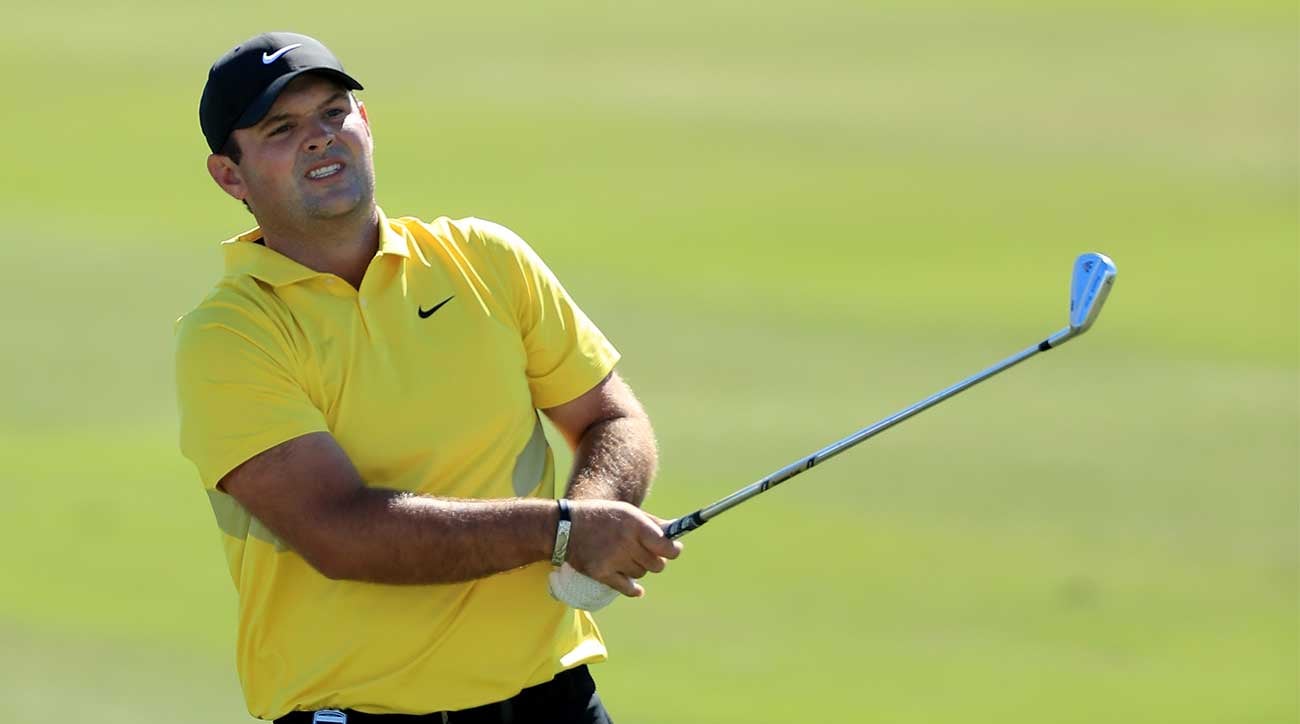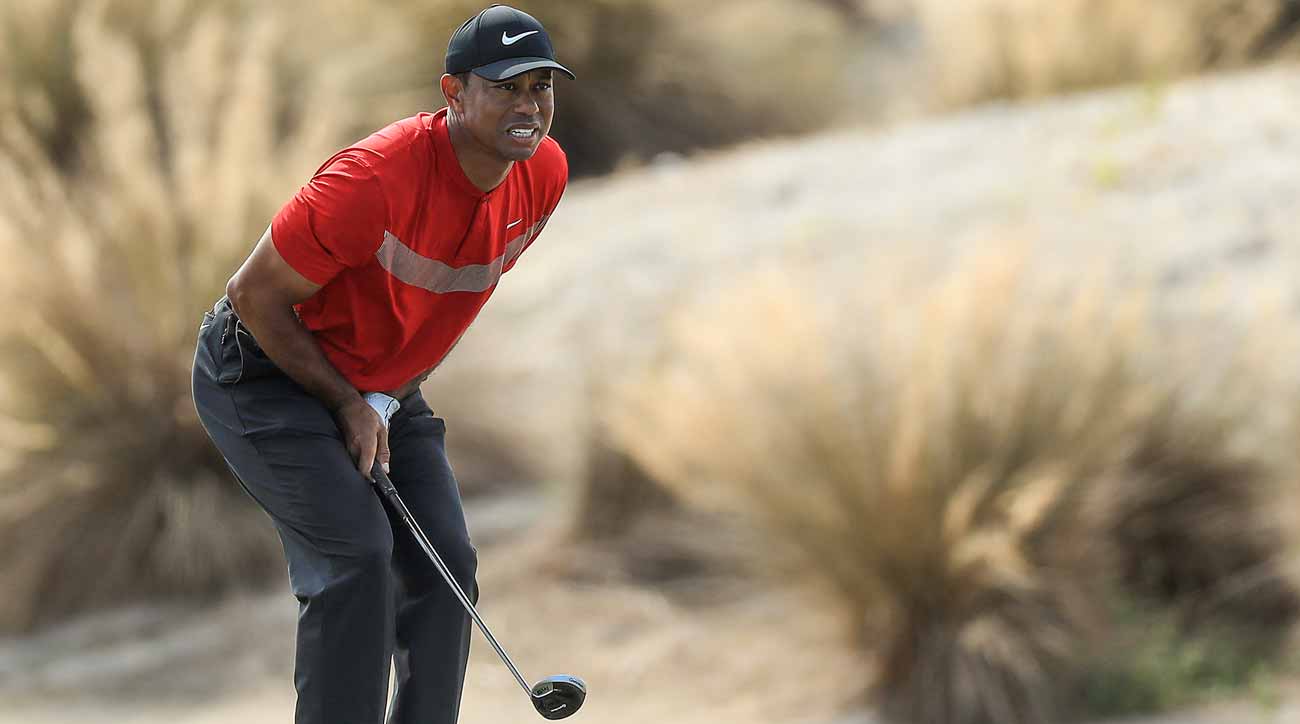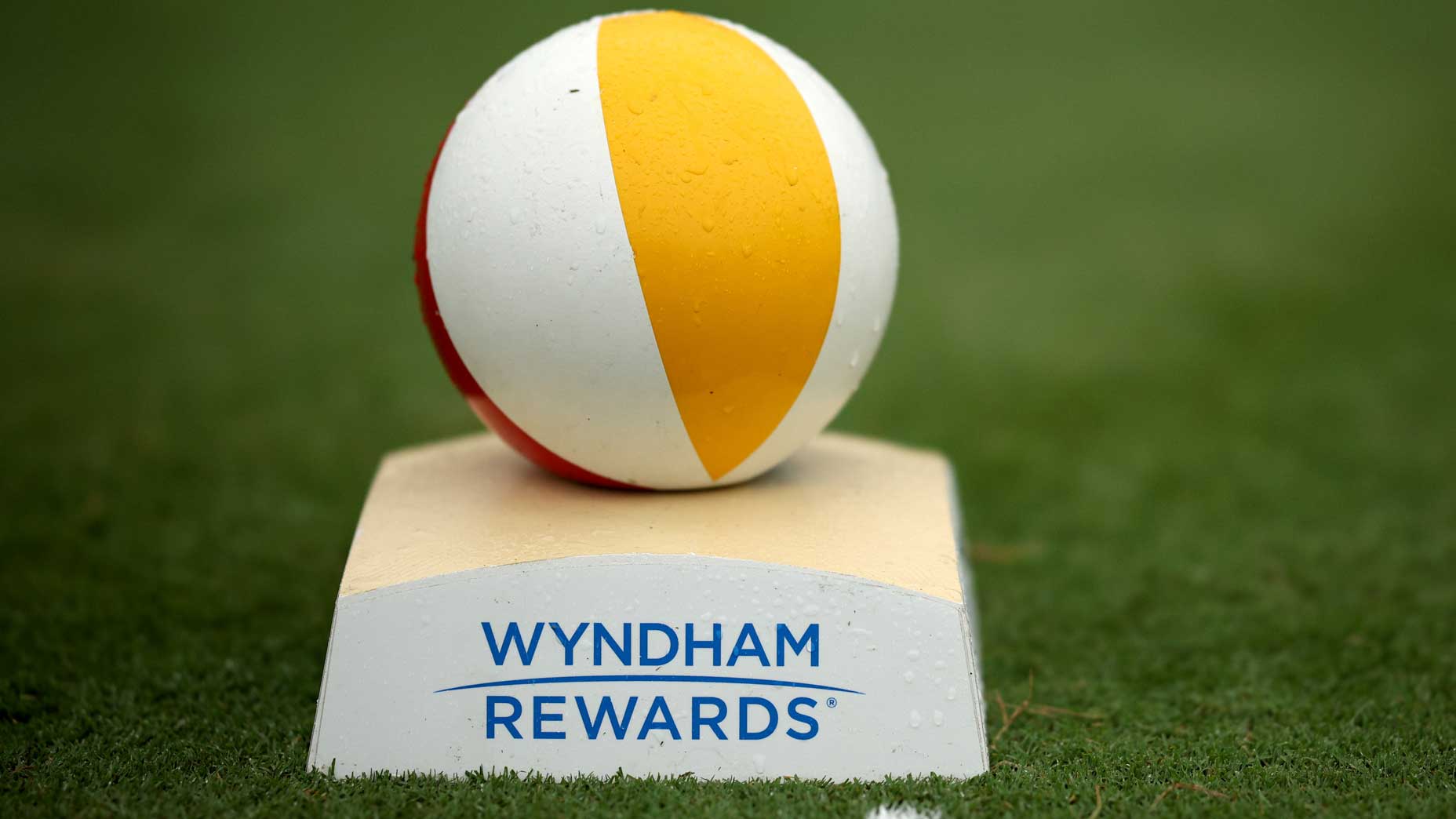 2025 CJ Cup Byron Nelson payout: Purse info, winner’s share
2025 CJ Cup Byron Nelson payout: Purse info, winner’s share
Tour Confidential: Should Patrick Reed have been disqualified for his controversial rules infraction?

Check in every week for the unfiltered opinions of our writers and editors as they break down the hottest topics in the sport, and join the conversation by tweeting us @golf_com. This week we discuss Patrick Reed’s controversial rules infraction at the Hero World Challenge and look ahead to the Presidents Cup (and pick a winner).
1. While Tiger Woods contending and pre-Presidents Cup storylines generated buzz at the Hero World Challenge, Patrick Reed became the talk of the event when he was penalized two strokes for violating Rule 8.1. In the third round, Reed improved his intended line of play when he brushed sand away from his ball while taking two practice swings. The incident sent social media into a frenzy, but Reed later said the infraction was unintentional, claiming a different camera angle would have showed he didn’t, in fact, improve his lie. The two-stroke penalty proved costly, given Reed ultimately finished just two back of winner Henrik Stenson. The court of public opinion — including some of his fellow pros — was not kind to Reed, with Presidents Cupper Cameron Smith saying, “I don’t have sympathy for anyone who cheats.” What’s your take on this latest rules kerfuffle? Was the infraction so egregious that Reed should have been disqualified?
Josh Berhow, managing editor (@Josh_Berhow): From what I understand, rules official Slugger White said intent didn’t matter here, but Reed could have been DQ’d under Rule 1.2a, which covers player conduct (and is what Sergio was DQ’d for in Saudi Arabia in February). At the time of this incident, no, I didn’t think Reed should have been DQ’d — he should get the benefit of the doubt — but after seeing a video of him allegedly doing the same thing at the 2015 Hero? That’s too much of a coincidence if you ask me. And here are other things to consider: When you go into the bunker, or any pro you watch on TV for that matter, how often do you put your club behind the ball and take a practice swing? That’s bizarre; and he did that in both aforementioned situations. It was alarming how immediate the practice swing was as soon as Reed entered the bunker in the 2015 incident. What does 2015 have to do with 2019? Maybe not a lot. Then when you also recall his unsavory allegations from his college days and, well… how many other players does this stuff happen to?
Josh Sens, senior writer (@JoshSens): It was bad, for sure. But I don’t think we need to draw on old evidence to come to a verdict on how shady-looking it was. In a way, it was a fitting incident for our era of “fake news” and “alternate facts.” You do something that seems pretty plainly egregious, and then tell people not to trust their eyes, that what they saw was not in fact what happened. Different camera angle? I’m not buying that another view would have revealed anything different than what we all saw.
Michael Bamberger, senior writer: I would have tossed him.
Sean Zak, senior editor (@Sean_Zak): Unfortunately for Slugger or whomever would have made the decision, there are no former incidences on THE PGA TOUR where Reed was so blatantly in the wrong. None I can think of, at least, so I think his reputation is a moot point. The bottom line for me is that what he did, as Berhow said, was bizarre. That’s a really, really weird move to go behind the ball and do little half swings. Players in the waste area were doing exactly that TO THE LEFT of their balls all week. That’s how you should do it. Perhaps an addendum is required?
Dylan Dethier, senior writer (@dylan_dethier): After listening to Reed’s explanation on Friday, I spent much of Saturday’s round at the Hero scanning through waste areas for different shapes and sizes of footprints. Where there was firm sand, the footprints weren’t deep enough. Where the sand was soft, the indentations weren’t big enough to satisfy his explanation. To summarize — I’m not buying it. In my eyes, no need for a DQ, though. He had plausible deniability, and he’d been savaged in the court of public opinion by the time he teed off on 13. That’s punishment enough.
Bamberger: Dear gentle young colleagues: there was inconvenient sand behind his ball when he got there. There was less after those two practice swings. That’s egregious.
2. PGA Tour rules official Slugger White spoke to media members afterward about Reed’s penalty. “He could not have been more of a gentleman; he was unbelievable,” White said. “He said — he had a different look at it. The angle that we had was behind and he’s looking from on top, so he may not have — I don’t know if he could have seen it as clearly as we did, but he could not have been a better gentleman.” How would you assess how the Tour handled the situation, and should the Rules of Golf allow more flexibility for tournament officials to interpret a player’s intent when it comes to rules violations?
Berhow: Given the information they had I thought the Tour handled it … fine. It was weird to see Slugger White go out of his way to praise Reed like he did. What was Reed going to say? He saw the same video we did; there was nothing he could do to justify his actions. So I guess the other thing the Tour could have done was DQ Reed, but Rule 1.2 isn’t exactly one you want to pull out of your back pocket too often, unless it really warrants it. (Phil never even got it at Shinnecock Hills for playing hockey on the green.) So even if more flexibility was offered to officials I don’t think it would be implemented often, simply because it’s such a slippery slope, and a can of worms no one wants to open.
Bamberger: Slugger is a gentleman. He’s looking out for the game.
LISTEN: Slugger White joins the Drop Zone podcast
Sens: Why does it matter that Reed was a “perfect gentleman” in accepting the penalty? His reaction is irrelevant. What’s relevant is what he did and what was and wasn’t done in response. It would be refreshing if Tour rules officials didn’t feel the need to bend so far over backwards to be polite about these things. A lot of fans have been left feeling that there either isn’t a mechanism in place — or the will, for that matter — to properly address incidents like this one, which makes the verdicts in the court of public opinion all the harsher.
Zak: It’s so, so golfy to see what happened and then discuss someone’s attitude throughout. That said, Slugger was asked a question and he answered it. Things like this happen so rarely that, yes, I think more flexibility would be a good thing. Then they might never happen at all.
Dethier: I was one of four or five reporters at this presser, and I think Slugger was basically preempting anything suggesting Reed had argued with the call. For what it’s worth, I think Reed DID handle the incident fairly calmly. But I think the Tour sees its job as protecting the players, and even though that’s not what we necessarily want from the rules arbiters, that’s what we got here.
Bamberger: He created the incident.
ADVERTISEMENT
3. Reed will join the U.S. squad at this week’s Presidents Cup, where there’s sure to be plenty more discussion about the topic. Australian Mark Leishman said Reed’s penalty should give fans “good ammo” if they needed it. What kind of impact will this situation have on each Presidents Cup team?
Berhow: Reed’s lucky it’s not a Ryder Cup; I think the European fans would get after him a lot more than what we’ll see in Australia. But it will have an impact. It’s not anything Tiger has to address as a team or anything, but it’s a distraction since it will be on the minds of the U.S. teammates paired with Reed, especially when they hear about it from fans. For the Internationals maybe it turns into the motivational spark they need?
Bamberger: It’s a disaster for the team and for Tiger. Who would WANT to play with him?
Sens: It definitely makes things awkward for partner play. But Reed has been pretty unflappable in the face of heckling and unflattering headlines before. He even seems to feed off them. I’m not convinced that Aussie fans getting on him is going to affect him or the team. But given what Cameron Smith had to say about the situation, the prospect of a Reed/Smith singles match sure is interesting.
Zak: I think it inspires those who will play against Reed, and perhaps could alienate his partners a bit. But largely, I think the Aussie fans will know better than to let it get out of hand. Reed genuinely seems to not care. If that’s true, I expect him to play well, cementing his role as a villain.
Dethier: American players will be sick of the question before they even land in Australia. It’s sort of unbelievable that we’re facing down a Patrick Reed controversy this week that’s completely unrelated to Reed tossing his teammates and captain under the bus, which is what happened in his last team competition. But it certainly adds a layer of intrigue to team dynamics.
4. Tiger Woods had another strong week at the Hero, finishing 4th. How many Presidents Cup matches would you expect Captain Woods to call upon himself to play at Royal Melbourne? We’ll set the over-under at 3.5.
Berhow: Tiger played well enough to call his own number as many times as he wants, but I really think he wants to be a captain and enjoy the strategy and duties that come with that. I think he’s pumped to be the guy to pull the strings. I’ll take the under, barely, as he plays three of the five sessions, sitting himself for foursomes on Friday and Saturday afternoon.
Bamberger: How many can you play in? All of them.
Sens: One match for Tiger each day. Though I’d be happy to be wrong about this.
Zak: Over! Tiger plays four matches because there is built-in breaks in the schedule. He’ll play each of the first two days, once on Saturday and then his Sunday singles match.
Dethier: Zak’s right (for once).
5. Prediction time: Who wins the Presidents Cup, and name your winning team’s MVP.
Berhow: It will be closer than most are expecting it to be, which will make for thrilling Saturday night TV in the States. The U.S. will win because it’s that much deeper and the chemistry thing is a real factor. It’s not as easy for a team that consists of players from several different countries to gel, so it’s always an uphill battle for the International squad out of the gate. As for your MVP? Xander Schauffele, who surprisingly has not played in any Ryder Cups or Presidents Cups until now. He’ll be psyched for his debut and will pile up some points.
Bamberger: Internationals, because of jet-lag, Reed hangover, and the unique challenges of the course. Leishman for MVP.
Sens: Internationals in a hard-fought upset, for the reasons Michael cites. You could also argue that late changes to the teams — Koepka out; a birdie machine named Ben An replacing a struggling Jason Day — benefits the Internationals on paper. This one is not as lopsided as the oddsmakers have made it out to be.
Zak: The Americans win when, from the final match, Tiger Woods closes out Adam Scott in a GOAT ball-striker singles duel — 16-14, MVP is Reed.
Dethier: The U.S. in a squeaker. I liked the look of Justin Thomas’ short game this week, and he’s likely to play every session — MVP!
6. Phil Mickelson is the latest big-name pro to commit to the controversial event in Saudi Arabia, which means he’ll skip the Phoenix Open, a tournament that he has played 30 times and which, as a former ASU Sun Devil, has great sentimental value to him. What’s your read on Mickelson’s decision?
Berhow: Phil is Phil, so maybe it’s not that surprising after all. But what surprised me was how he did it, on Twitter, defending his actions to go overseas when several players avoid the topic, and then writing off Phoenix with a simple tweet of “There’s a good chance I’ve played my last Phoenix Open.” Seemed like an anticlimactic — if not unfair — swan song for Phoenix fans.
Sens: He went for the money. That’s his prerogative. But he should at least be honest about it. Even if you believe his “grow the game” explanation passes the b.s.-smell test (note: it doesn’t), and even if you set aside the grotesque politics of the place, is Saudi Arabia really where we should be growing the game anyway? It’s a desert, with kiln-like year-round temperatures and about a puddle’s worth of annual rainfall. This is the very opposite of the kind of sustainability the game has been making strides toward. After he’s done growing the game in Saudi Arabia, maybe Mickelson can put his efforts toward promoting alpine skiing in the Sahara.
Bamberger: He went for the money. Same reason guys go to China and play in the smog. That country is not exactly a great hotbed of freedom. Gordon Gekko said greed is good. He was wrong.
Zak: It reminded me that, with a lot of these guys, they see certain actions/decisions and their only lasting thought is about dollars and cents. Their life, though masked at times in the chase for legend, can be whittled down to a rat race to grab value wherever and while it is available. Think about how many people will be discussing this when Mickelson is prepping for the U.S. Open in June. Or when he’s looking to defend at Pebble in February. It sucks to be this fleeting, but this too shall pass for him.
Dethier: What gets me isn’t that he (and others) are going but how completely dismissive they are when asked about it. We don’t ask for much from these guys; hearing that they were at least conflicted about going would be a good start. But I’m guessing that wouldn’t be received well by the guys signing the checks.
To receive GOLF’s all-new newsletters, subscribe for free here.
ADVERTISEMENT






